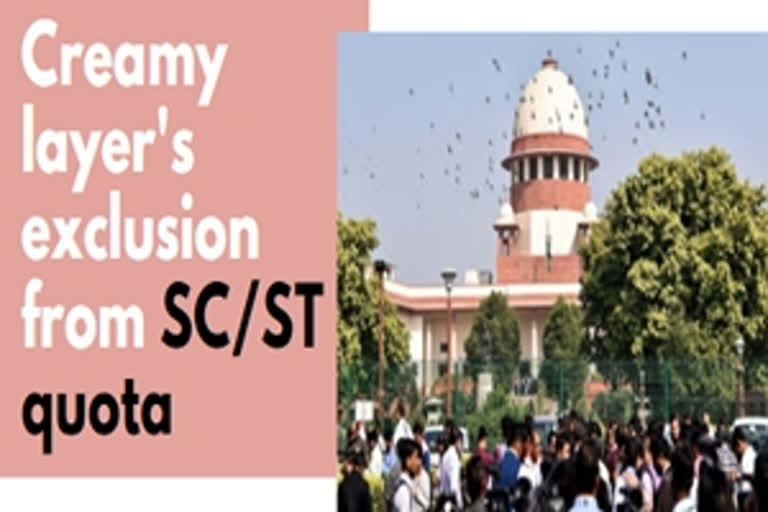வருமான உச்ச வரம்பை விட அதிகம் சம்பாதிக்கும் ஓபிசி பிரிவினருக்கு வேலை வாய்ப்பு மற்றும் படிப்பில் இட ஒதுக்கீடு ஆகியவை பெற முடியாது. இதை கிரீமி லேயர் எனக் கூறுகிறார்கள். இந்த கிரீமி லேயர் முறை எஸ்.சி., எஸ்.டி., பிரிவினருக்குப் பொருந்தாது.
இந்நிலையில், ஜர்னைல் சிங் வழக்கில் கடந்த ஆண்டு தீர்ப்பு வழங்கிய உச்ச நீதிமன்றம் எஸ்.சி., எஸ்.டி., பிரிவுகளுக்கும் கிரீமி லேயர் முறை பயன்படும் எனத் தெரிவித்திருந்தது.
இந்தத் தீர்ப்பை எதிர்த்து மத்திய அரசு சார்பில் உச்ச நீதிமன்றத்தில் மறு ஆய்வு மனு தாக்கல் செய்யப்பட்டுள்ளது.
நேற்று நடைபெற்ற இந்த மனு மீதான விசாரணையில் மத்திய அரசு சார்பில், ஆஜரான தலைமை வழக்கறிஞர் கே.கே.வேணுகோபால், இந்திரா சாவ்னே வழக்கில் 5 நீதிபதிகள் கொண்ட அமர்வு 2008ஆம் ஆண்டு வழங்கிய தீர்ப்பில் எஸ்.சி., எஸ்.டி., பிரிவினருக்கு கிரீமி லேயர் முறை கூடாது எனக் கூறப்பட்டுள்ளது.
எனவே, எஸ்.சி., எஸ்.டி., பிரிவினருக்கு கிரீமி லேயர் முறையிலிருந்து விலக்கு அளிக்க வேண்டும். மேலும், இந்த மனுவை ஏழு நீதிபதிகள் கொண்ட அமர்வுக்கு மாற்றியக்க உத்தரவிட வேண்டும் என்றார்.
அங்கே மெஸ்ஸிக்கு பலான் டி ஆர் விருது; இங்கே ரொனால்டோவுக்கு சிறந்த வீரருக்கான விருது!



